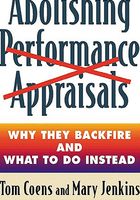
Preface to the Paperback Edition
When we joined up to write this book five years ago, we fully realized that the lion’s share of business leaders would view our call to abolish performance appraisals as radical and extreme. After all, just about everybody has grown up getting grade cards in school and college. Then, as people entered the workforce, the familiar pattern of being graded and rated resumed with the performance appraisal. Though we knew no one found glee and joy in the annual review, it was painfully clear that our challenge would defy conventional wisdom and the most sacred of corporate traditions. We had little doubt that most would view abolishment as nonsense—performance appraisal, like filing a tax return or getting the annual dental check-up, is just another one of life’s unpleasant but necessary evils.
To our surprise, however, the book and its theme have resonated with an enthusiastic audience that includes both organizational leaders and human resources professionals. The overwhelmingly warm response has exceeded our most far-fetched fantasies, and we are humbly grateful. We have heard from countless companies in every industry, including education and non-profits, that have undertaken serious steps toward eliminating performance appraisal. While we anticipated small- and medium-sized businesses would heed the call, it was astonishing to learn that giants such as Accenture, Amoco, Levi Strauss, Merck, Nokia, and others have seriously explored moving away from conventional performance appraisal. Even in the public sector, where the marriage to performance appraisals has endured nearly two hundred years, leaders see the end of appraisal as the beginning of fostering a highly energized workforce.
The vision of a radically new workplace is not uniquely ours—it is the yearning of millions worldwide who, like us, have lost patience with performance appraisal and how it wastes time, causes stress, and destroys commitment and relationships. Certainly, abolish performance appraisals, but this is merely the symbol of a far more profound journey. Letting go of performance appraisal is the charter for a powerfully different kind of workplace—one that foremost recognizes that employees are adults who want to be responsible for themselves and who, with the right encouragement and a collaborative work environment, will joyfully accept accountability for their own work performance, improvement, and growth. Getting rid of annual forms does not achieve this, but it helps immensely to clear the transformational pathway for unleashing human commitment and potential.
With this new edition, we summon you to this journey. The end is not to abandon the important purposes associated with performance appraisal. Rather, it is a call to get really serious about performance, feedback, and fair pay by relying on realistic premises and assumptions that align with the human spirit. People don’t want another form. They do want challenge, trust, a work climate that balances freedom and support, and genuine appreciation for their unique talents and contributions.
Great organizational performance also requires more: a clear and commonly-shared sense of purpose and direction, and unifying beliefs that define the organization. This is represented neither by a placard in the lobby nor by a canned list of strategic goals. It is, however, a widely-understood aim and way of thinking that pervades every nuance of the organizational life—culture, environment, structures, leadership styles, policies, procedures, meeting interactions, marketing initiatives, job descriptions, personnel practices, and so much more. Eliminating appraisal is the easier part of this path. The thickets and boulders emerge in doing the important work of clarifying and reshaping the organization’s shared sense of purpose and beliefs.
Though transformation is never easy, the joy is in the journey, in exploring and sorting out the deeper questions about work and the human spirit.
Tom Coens
Mary Jenkins
June 2002